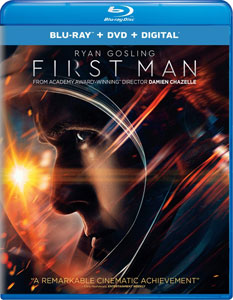After his love letters to jazz — “Whiplash” (2014) and “La La Land” (2016) — a film fan wouldn’t be surprised if director Damien Chazelle’s next movie was about Louis Armstrong. But “First Man” (2018) instead chronicles Neil Armstrong, and while it might seem like the pantheon of historical space-program cinema doesn’t need another recounting of Apollo 11, it turns out this is a very welcome addition.
Writer Josh Singer (“The Fifth Estate,” “The Post”) – working from a book by James R. Hansen — does his best job yet of turning a piece of history into a gripping narrative. “First Man” focuses on the notoriously reclusive Armstrong (1930-2012), although it certainly offers plenty for space buffs who are into the wider historical narrative.
With Ryan Gosling giving an appropriately understated performance, Armstrong comes off as a man whose mind is always at least 50 percent preoccupied by his young daughter Karen’s (Lucy Stafford) cancer, and then her death. Other key moments illustrate that death is a way of life for 1960s NASA astronauts, including Ed White (Jason Clarke), who is just starting to become a friend to Armstrong, being killed in the tragic Apollo 1 fire.
Less dramatically, Neil is naturally this way, and Singer and Chazelle nicely illustrate his nature in the farewell to his family before embarking on the Apollo 11 mission. Janet Armstrong (Claire Foy) doesn’t want their two sons’ last memory of their father to be packing a briefcase, so she makes her husband sit down and explain that he might not come back. Neil talks to his sons using the same language he uses at press conferences, where he is notably terse.
In addition to digging into the title character, the other thing “First Man” does that’s different from most space-program films is it shows all of the danger of the 1960s Gemini and Apollo programs, and much less of the grandeur. We all know about the horrific fire on Apollo 1 that killed Gus Grissom (Shea Whigham), the leading candidate to be the first man on the moon. But Chazelle also brings the terror into the successful saves – like when Armstrong stops his spinning module on Gemini 8 – and the missions that go off without a hitch, like his landing of the LEM with barely enough fuel to spare.
It’s like early space-program porn as Chazelle zeroes in on Armstrong’s field of vision, which seems a bit too preoccupied with danger: the rivets holding the module together, the condensation covering the window, the analog readouts and printed-out checklists. The sound design emphasizes the creaks and groans. And cinematographer Linus Sandgren takes a step toward mimicking what archived 1960s footage would look like, further reminding us that this was a half-century ago and that the bravery of these astronauts is unfathomable to most of us.
We see a NASA official preparing the official statement announcing the deaths of Armstrong and Buzz Aldrin (Corey Stoll), should it be needed. Far from a gung-ho celebration of country or humanity or bravery, “First Man” is arguably pessimistic – but to me, it’s more emotionally realistic than most other portrayals of this topic.

“First Man” lightly taps into the politics of the time, including an interlude where a black beat poet speaks of his daily struggles with doctor’s bills and paying rent while “Whitey’s on the moon.” A clip shows Kurt Vonnegut arguing that making New York City livable might be a better federal expenditure than going to the moon. Another clip reminds us that the US government is sending Americans to pointlessly die in Vietnam at the same time it’s sending them to the moon.
Still, “First Man’s” prevailing perspective is that of Ed White, who tells Neil that his son asked him about how the Apollo module’s control panels will be different from Gemini’s. The boy’s mind has expanded thanks to the moon missions, and by extrapolation, the horizon of humanity’s collective consciousness has moved thanks to the very idea of going to the moon.
Politics and bigger ideas aside, though, “First Man” comes back to Armstrong, and my takeaway is that he wouldn’t have wanted to be portrayed as a hero – at least not more than any other astronaut. When he says he’s “pleased” – rather than elated – to be chosen to be the first person on the moon, “First Man” makes me believe that statement.

